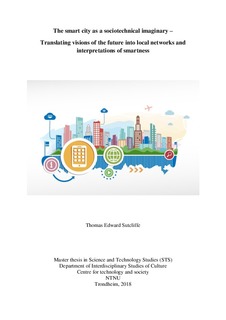The Smart city as a sociotechnical imaginary - Translating visions of the future into local networks and interpretations of smartness
Master thesis
Permanent lenke
http://hdl.handle.net/11250/2505767Utgivelsesdato
2018Metadata
Vis full innførselSamlinger
Sammendrag
This thesis explores smart cities in a European and Norwegian context. Methodologically, the thesis draws on semi-structured qualitative interviews with municipality workers, 60 structured quantitative interviews with citizens in Trondheim, and document analysis to capture a broad perspective on smart cities. Additionally, I actively use STS theories on actor-networks and sociotechnical imaginaries to study how smart cities are translated from an international to a local context. I show in this thesis that climate change and societal issues are influencing the European Union (EU) to rethink courses of technological and societal development. This led to smart cities as a solution to mitigate climate change impact. Since 2012, cities in Europe have been shifting their attention towards the EU led initiative “Horizon 2020”, where prioritizing sustainable and “smart” development of urban spaces is prioritized. I then explore how Trondheim municipality became involved in Horizon 2020 and that municipality workers translate the European smart city as a sociotechnical imaginary into local networks and interpretations of smartness. Through the insights from municipality workers and citizens in Trondheim, I show that there are differences in how the “public” and the municipality perceive smart cities. The municipality workers interpret the smart city as tightly bound to business development and that the smart city platform can enable business opportunities that otherwise would be difficult. However, whereas the citizens are unaware of the municipality’s involvement with Horizon 2020. The unawareness the data shows, points to an unsuccessful enrolment of the citizens to Trondheim municipality’s smart city development.
However, much of the critique of smart cities as an urban development strategy lies on its heavy neo-liberal aspects, and that the public is to engage and co-produce technological- and societal transitions in cities. Lastly, smart city approaches and development also raise important issues to address. For instance, with smart cities largely basing themselves on implementation of information-and communication technologies and open data solutions, issues regarding data security and privacy arise. In light of the Facebook scandal in the spring of 2018, these topics are actualised. Keywords: smart cities, translation, sociotechnical imaginaries, innovation, sustainability, climate change, EU, citizen engagement.
